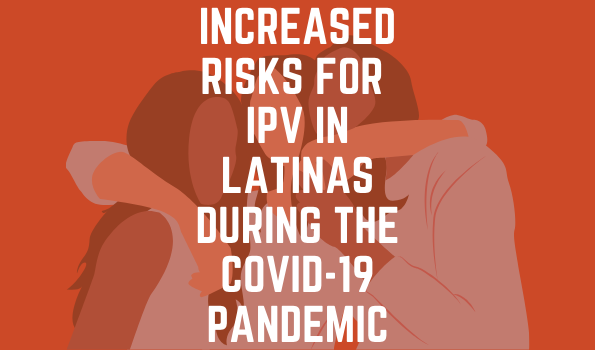Rates of Intimate Partner Violence (IPV) among Latinas are similar to those of other groups. However, Latinas may experience added barriers such as limited access, limited English proficiency, and shortage of culturally responsive services and professionals. While social distancing and quarantine are the most effective and recommended measures to limit COVID-19 contagion, it may create added risks for survivors of IPV, including Latinas.

Added risks to consider during the COVID-19 pandemic:
Increased financial stress: Limited work activities result in decreased incomes creating added economic burden. For Latinas who comprise part of the “informal workforce” that includes domestic work and caregiving jobs, not going to work due to health recommendations results almost immediately in loss of income.1
Limited clinical services: During the COVID-19 pandemic some areas have lockdowns in place where continued exposure to perpetrators and limitations of face to face interventions becomes a risk and may add stress.2
Continued exposure to perpetrators: Social distancing measures can increase tension, feelings of isolation among survivors, as well as increased levels of danger. For Latinas who value familismo this results in a limited support system and exacerbation of mental health symptoms.2
Changes in procedures for legal recourses: Latina survivors may be misinformed, in some cases by their perpetrators as to the legal recourses available during the pandemic. This may result in added stress, fear, and vulnerability.3
Fear associated with immigration status: Perpetrators may use immigration status as a control mechanism. Furthermore, survivors may be unaware of the resources available for undocumented immigrants adding stress and fear during the COVID-19 pandemic. It´s a moment when the net of coercive control can be tightened. In fact, “social distancing” and “isolation” are core tactics of a coercively controlling partner.4
POWER AND CONTROL
IPV dynamics have to do with the exercise of power and control. Some of the control mechanisms reported during the COVID-19 pandemic include:
- Misinformation about the virus to create fear and increase control. In Latinas who may be uninsured, this mechanism can generate intense fear and vulnerability.
- Retention of essential supplies such as soap, sanitizers, and other disinfectants.
- Threats of deportation for undocumented immigrants.
- Limited access to communication with support systems.5
- Restriction of health insurance cards and other important documentation.
- Misinformation about available legal recourses.3
During the COVID-19 pandemic:
- Medical services are available for everyone regardless of immigration status. Health care workers should not ask for immigration status information. If survivors are asked about health insurance, a possible response is “I am not eligible for health insurance and do not want to apply.” 6
- Most courts are issuing restraining orders, some are available upon request online. For available information on legal resources access www.WomesLaw.org
- Shelters may be operating in your area and/or offering services via technology. For survivors for whom telephone or video conferences may create added risks, chats may be a more secure option. If there are concerns about tech-related safety, consider additional resources in TechSafety.org7
- Survivors should consider reaching out to a trusted friend, co-worker, or family member who could check in with you about your safety and support needs.
RESOURCES
- National Latin@ Network Hotline: 651-772-1611 www.nationallatinonetwork.org
- The National Domestic Violence Hotline is 24/7, confidential and free: 1-800-799-7233 and through chat. Services available in Spanish. www.ncadv.org
- The National Sexual Assault Hotline is 24/7, confidential and free: 800-656-HOPE (4673) and through chat. Services available in Spanish. www.rainn.org
- The StrongHearts Native Helpline for domestic and sexual violence is available from 7:00 am to 10:00 pm CT, confidential, and specifically for Native communities: 1−844-762-8483
- The Trans LifeLine for peer support for trans folks from 9:00 am to 3:00 am CT: 1-877-565-8860. This hotline is staffed exclusively by trans operators, is the only crisis line with a policy against non-consensual active rescue.
- National Parent Helpline available from Monday to Friday, 12:00 pm to 9:00 am CT. Provides emotional support and advocacy for parents: 1-855-2736
For more information on Latinas and gender-based violence, please access our page at: https://mhttcnetwork.org/centers/national-hispanic-and-latino-mhttc/product/gender-violence-booklet
REFERENCES
- Organización de las Naciones Unidas Mujeres. (2020). COVID-19 en Latinoamérica y el Caribe: Cómo incorporar a las mujeres y la igualdad de género en la gestión de la respuesta a la crisis. https://lac.unwomen.org/es/digiteca/publicaciones/2020/03/covid-como-incorporar-a-las-mujeres-y-la-igualdad-de-genero-en-la-gestion-de-respuesta
- International Committee of the Red Cross. (2020, April 7). Prevention and response to sexual and gender-based violence in COVID-19 Quarantine Centers: Recommendations and best practices. https://www.icrc.org/en/publication/prevention-and-response-sexual-and-gender-based-violence-covid-19-quarantine-centres
- National Network to End Domestic Violence (NNEDV). (2020). Frequently asked questions during COVID-19. www.womenslaw.org
- The Conversation. (2020, March 19). Coronavirus lockdown is a dangerous time for victims of domestic abuse – here’s what you need to know. http://theconversation.com/coronavirus-lockdown-is-a-dangerous-time-for-victims-of-domestic-abuse-heres-what-you-need-to-know-134072
- National Domestic Violence Hotline. (2020, March 13). Staying safe during COVID-19. https://www.thehotline.org/2020/03/13/staying-safe-during-covid-19/
- Protect Immigrant Families. (2020). You have rights: Protect yourself: Going to the doctor [Factsheet]. https://protectingimmigrantfamilies.org/wp-content/uploads/2020/02/You-Have-Rights-Protect-Your-Health-Updated-February-2020-ENGLISH.pdf
- Futures Without Violence. (2020). Information on COVID-19 for survivors, communities and DV/SA programs. https://www.futureswithoutviolence.org/get-updates-information-covid-19/

